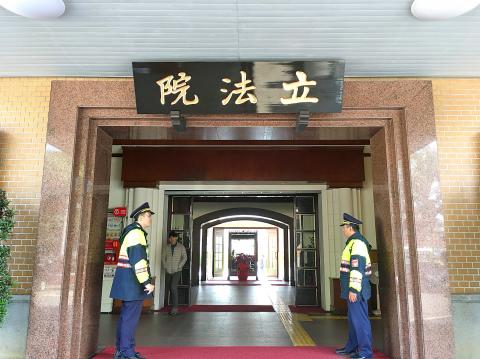President Tsai Ing-wen (蔡英文) yesterday said that her administration would push an initiative through the Legislative Yuan that would outlaw the activities of “Chinese communist surrogates.”
The legislation would strictly regulate activities by people, groups or institutions that could undermine national security by spreading Chinese propaganda, making statements on Beijing’s behalf, or participating in official events hosted or organized by China, Tsai said on Facebook
The proposal is to be introduced when the legislature begins its new session in September, she said, adding that she hopes it could pass before the end of the session.

Photo: Lin Liang-sheng, Taipei Times
Tsai also expressed gratitude to lawmakers for passing amendments to the Act Governing Relations Between the People of the Taiwan Area and the Mainland Area (台灣地區與大陸地區人民關係條例) on Wednesday.
Retired officers who held the rank of major general or above and civil servants of vice ministerial rank or above are prohibited from divulging state secrets or attending official events held by China, she said.
Penalties stipulated by the amended act include the revocation of pensions or fines of up to NT$10 million (US$321,471), she added.
Taiwan is a free nation where people can form different political beliefs, and most veterans are patriotic and rightfully enjoy their pensions, Tsai said.
However, a minority of generals should not be allowed to travel to China to sing the Chinese national anthem or salute the communist flag, as such actions are detrimental to Taiwan’s interests and dignity, she said, adding that such people deserve the “severest penalties” under the law.
Democratic Progressive Party (DPP) lawmakers have agreed to set additional amendments to the act that Tsai’s administration has proposed as a legislative priority for the upcoming session, sources said.
An additional clause to Article 33 would stipulate penalties for people, groups or institutions that have acted against Taiwan’s national security or social stability as surrogates of the Chinese Communist Party, the Chinese government or China’s armed forces, they said.
Another clause would stipulate penalties for spreading Chinese propaganda, attending events held by Chinese officials or making joint statements with the Chinese government if those activities are deemed harmful to Taiwan’s national security or conducted on China’s behalf, they added.
The sources did not disclose details about proposed penalties, but described them as severe.
DPP Legislator Kuan Bi-ling (管碧玲) confirmed that the amendments have been sent to the appropriate committee for deliberation.
Chinese Nationalist Party (KMT) caucus whip William Tseng (曾銘宗) was noncommittal, saying that the KMT’s disposition depends on whether the legislation is a genuine boost to national security or an electoral stratagem of the DPP.
“The KMT will oppose to the last any law that exceeds that which is necessitated by national security,” he added.
Additional reporting by Su Fun-her and Chen Jen

PREPAREDNESS: Given the difficulty of importing ammunition during wartime, the Ministry of National Defense said it would prioritize ‘coproduction’ partnerships A newly formed unit of the Marine Corps tasked with land-based security operations has recently replaced its aging, domestically produced rifles with more advanced, US-made M4A1 rifles, a source said yesterday. The unnamed source familiar with the matter said the First Security Battalion of the Marine Corps’ Air Defense and Base Guard Group has replaced its older T65K2 rifles, which have been in service since the late 1980s, with the newly received M4A1s. The source did not say exactly when the upgrade took place or how many M4A1s were issued to the battalion. The confirmation came after Chinese-language media reported

The Taiwanese passport ranked 33rd in a global listing of passports by convenience this month, rising three places from last month’s ranking, but matching its position in January last year. The Henley Passport Index, an international ranking of passports by the number of designations its holder can travel to without a visa, showed that the Taiwan passport enables holders to travel to 139 countries and territories without a visa. Singapore’s passport was ranked the most powerful with visa-free access to 192 destinations out of 227, according to the index published on Tuesday by UK-based migration investment consultancy firm Henley and Partners. Japan’s and

A Ministry of Foreign Affairs official yesterday said that a delegation that visited China for an APEC meeting did not receive any kind of treatment that downgraded Taiwan’s sovereignty. Department of International Organizations Director-General Jonathan Sun (孫儉元) said that he and a group of ministry officials visited Shenzhen, China, to attend the APEC Informal Senior Officials’ Meeting last month. The trip went “smoothly and safely” for all Taiwanese delegates, as the Chinese side arranged the trip in accordance with long-standing practices, Sun said at the ministry’s weekly briefing. The Taiwanese group did not encounter any political suppression, he said. Sun made the remarks when

BROAD AGREEMENT: The two are nearing a trade deal to reduce Taiwan’s tariff to 15% and a commitment for TSMC to build five more fabs, a ‘New York Times’ report said Taiwan and the US have reached a broad consensus on a trade deal, the Executive Yuan’s Office of Trade Negotiations said yesterday, after a report said that Washington is set to reduce Taiwan’s tariff rate to 15 percent. The New York Times on Monday reported that the two nations are nearing a trade deal to reduce Taiwan’s tariff rate to 15 percent and commit Taiwan Semiconductor Manufacturing Co (TSMC, 台積電) to building at least five more facilities in the US. “The agreement, which has been under negotiation for months, is being legally scrubbed and could be announced this month,” the paper said,